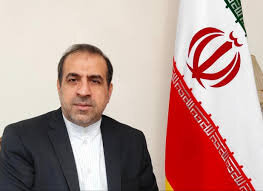Tehran ambassador emphasizes India's ‘importance’ amidst potential US bans
Indian FM says Chabahar is for ‘everyone's benefit’

TEHRAN - The Iranian ambassador has said that the “importance of India” will prevent any country from imposing sanctions on New Delhi over its cooperation with Iran.
Iraj Elahi, in an interview with the Hindustan Times published on Tuesday, pointed out that any possible sanctions by the U.S. would harm the trade of many countries, not just India or Iran.
After India and Iran signed a long-term agreement for expanding Indian operations at Chabahar port on May 13, the U.S. warned that all entities engaging in business deals with Iran face the “potential risk of sanctions.”
US State Department deputy spokesperson Vedant Patel said that any entity considering business deals with Iran needs to be aware of the potential risk of sanctions.
But Delhi backed the deal with Tehran and said the agreement would benefit the region.
"I think it's a question of communicating, convincing and getting people to understand that this is actually for everyone's benefit. I don't think people should take a narrow view of it," Indian Foreign Minister S Jaishankar told reporters on Tuesday. He was responding to a question about Washington's remarks on the deal.
Elahi told the Hindustan Times that any U.S. sanctions would harm the trade interests of numerous countries that are looking at Chabahar as a transit hub.
Ports and Shipping Minister Sarbananda Sonowal also said on Monday that the project is about encouraging Indian entrepreneurs to venture into the region from a long-term perspective.
The 10-year agreement signed by India and Iran will facilitate the long-term development of Shahid Beheshti terminal at Chabahar port, where operations are run by a subsidiary of state-run India Global Ports Limited (IGPL).
The firm plans to invest $120 million on equipping the terminal and India has also offered a credit window of $250 million to improve infrastructure around Chabahar.
The U.S. had granted a carve-out for Chabahar from its sanctions regime for Iran when New Delhi, Tehran and Kabul signed a tripartite agreement for developing the port in 2016. At that time, the U.S. decision was influenced by the port’s potential to facilitate trade and development in Afghanistan and lobbying by the Indian side.
It should be noted that Chabahar port had got a waiver from the U.S. sanctions under the U.S. administration led by former U.S. President Donald Trump. The U.S. and Indian officials will have to discuss the issue of waiver, what is expected to be extended to the pact as well.
Concluding his remarks, Elahi stated that the Chabahar project is not just for the benefit of Iran or India.
Chabahar will facilitate the transit of goods from Southeast Asia to Europe, Russia and Central Asia. If the U.S. imposes any sanctions on this project, it means that the U.S. is going to harm the trade of many countries, not just India or Iran.”
Both India and Iran see Chabahar, a deep-water port in Sistan-Baluchestan province, as a hub for the International North–South Transport Corridor (INSTC), which will allow shipping companies to use an alternative route that bypasses the sensitive and busy Persian Gulf and Strait of Hormuz. The port is also key to India’s ambitious plans to forge greater connectivity and trade ties with Iran, Afghanistan and the landlocked Central Asian states.
